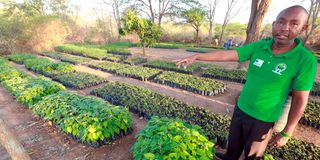Kitui seedling farmer drives towards 15 billion tree target

Francis Kavisu with some of the seedlings at the nursery in Unyaa, Kitui County.
What you need to know:
- Francis Kavisu began with Sh30,000, which was used to buy potting tubes and training. He hired a casual worker.
- We The Trees nursery mainly propagates senna, grevillea, neem, acacia, croton, mellia and indigenous tree seedlings.
When he is not on duty as human resource officer with the Teachers Service Commission in Makueni County, he is tending to his seedlings and training locals on the importance of growing trees in Kitui.
Francis Kavisu is the founder of We The Trees, Community-Based Organisation (CBO), that has been advocating for planting trees, raising seedlings and donating to farmers’ groups.
“We the Trees was registered in 2017 and launched in 2019 to mark my mother’s first anniversary since passing on,” Kavisu says.
“The launch was presided over by current for East Africa, Arid and Semi-Arid Lands and Regional Development Cabinet Secretary Peninah Malonza, Kitui Senator Enock Wambua and Commissioner for Revenue Allocation official Ben Muasya, who were my mother’s friends.”
Kavisu says he has always been passionate about environment and women empowerment.
“Starting the CBO was to complement what my mother was doing as a community leader. She was the chairperson of NG – NGAAF Kitui from 2013 to 2017,” he says.
“As women groups were engaged in their ordinary activities, especially table banking, we introduced them to planting and growing trees in their homes.”
However, there was the problem of sourcing the seedlings. That is how the idea of starting a nursery for the CBO was born. The aim was to have a constant supply of seedlings.
Kavisu began with Sh30,000, which was used to buy potting tubes and training. He hired a casual worker.
Tree seedlings
“After establishing the nursery, I realised that many people wanted seedlings. I increased the number of tree seedlings from 25,000 to 60,000,” he says.
“At the moment, the nursery has more than 200,000 seedlings, translating to at least Sh350,000 in expenditure.”
The CBO has been donating trees to women groups every year.
“We have donated more than 285,000 seedlings. The remaining are sold to keep our nursery afloat financially,” he says.

Francis Kavisu, the founder of We The Trees community-based organisation at the nursery.
“About 30 women groups, representing 1,350 households are members of the group. It means five to 10 trees are planted in the 1,350 households every year. The leaders of the groups ensure the survival rate of these seedlings is 96 per cent. A record is kept to ensure that those whose trees die do not get seedlings in the next cycle.”
The seedlings are donated to groups and families in Kitui West and Mutonguni ward.
“We donate to other areas on request. For instance, we recently donated seedlings to Museve Catholic Shrine, several schools and churches. We also encourage organisations and individuals to buy seedlings from us,” he says.
The nursery is approximately 1.5 acres.
Kavisu says he consulted the Kenya Forestry Research Institute (Kefri) and identified trees that can do well in Kitui.
Healthy seedling
We The Trees nursery mainly propagates senna, grevillea, neem, acacia, croton, mellia and indigenous tree seedlings.
The CBO engages women and young people to collect and grade the seeds before buying them.
He says the nursery workers are trained and experienced in propagating healthy seedlings.
“During labour intensive activities, especially potting, we engage around 30 women for three to four days, each getting Sh500 a day,” he says.
The nursery has only two attendants on the other days.
Kavisu says the CBO invested in a huge tank, from which rain water is harvested. The organisation buys water in times of scarcity.
We The Trees has partnered with the International Tree Foundation to rehabilitate Mutuluni forest.
The biggest challenge is getting individuals or organisations to partner with the CBO to produce more seedlings.
“We are keen on water harvesting, especially sand dams, which are suited for dry regions,” he says.





